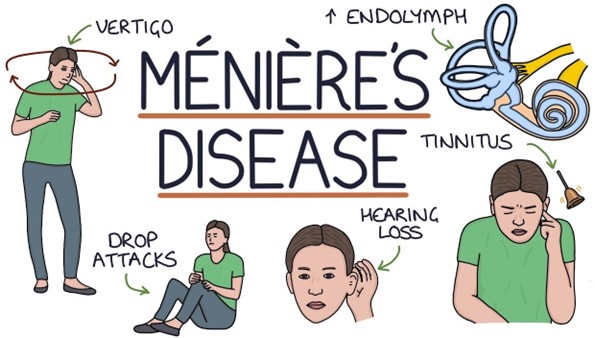A nurse is planning care for an older adult client who has Ménière's disease.
Which of the following interventions should the nurse include in the plan?
Encourage the client to change positions slowly.
Perform range-of-motion exercises to the client's neck every 4 hours.
Administer aspirin if the client reports a headache.
Limit the client's fluid intake to 1,500 mL per day.
The Correct Answer is A

This can help prevent dizziness and loss of balance, which are common symptoms of Ménière’s disease.
Choice B is not correct because range-of-motion exercises to the client’s neck every 4 hours are not a standard intervention for Ménière’s disease.
Choice C is not correct because aspirin is not always the recommended medication for headaches associated with Ménière’s disease.
Choice D is not correct because limiting fluid intake is not a standard intervention for Ménière’s disease.
Nursing Test Bank
Naxlex Comprehensive Predictor Exams
Related Questions
Correct Answer is A
Explanation
Place two-bed pillows between the legs when in bed.
To prevent hip dislocation after total hip arthroplasty, the nurse should place two-bed pillows between the client’s legs when in bed.
This helps maintain proper alignment and prevent the hip from dislocating.
Choice B is incorrect because leaning forward when attempting to stand can increase the risk of hip dislocation.
Choice C is incorrect because removing the wedge device when turning can increase the risk of hip dislocation.
Choice D is incorrect because elevating the knees higher than the hips when sitting can increase the risk of hip dislocation.
Correct Answer is B
Explanation
The nurse should attend to the client who has thrombocytopenia and reports a nosebleed first.

Thrombocytopenia is a condition characterized by low platelet count, which increases the risk of bleeding.
A nosebleed can be a sign of significant bleeding, and it is important for the nurse to assess the severity and take appropriate action to stop the bleeding and prevent further complications.
Although the other clients also require nursing care, their conditions are not as urgent as the client with thrombocytopenia and a nosebleed.
The client with chronic obstructive pulmonary disease and an oxygen saturation of 89% may require oxygen therapy or other interventions to improve respiratory function, but the situation is not immediately life-threatening.
The client with left-sided paralysis and slurred speech from a prior stroke may require ongoing care and rehabilitation, but there is no indication of an acute change in their condition.
The client with multiple sclerosis and ataxia and vertigo may require assistance with mobility and balance, but their symptoms do not pose an immediate threat to their health.
Whether you are a student looking to ace your exams or a practicing nurse seeking to enhance your expertise , our nursing education contents will empower you with the confidence and competence to make a difference in the lives of patients and become a respected leader in the healthcare field.
Visit Naxlex, invest in your future and unlock endless possibilities with our unparalleled nursing education contents today
Report Wrong Answer on the Current Question
Do you disagree with the answer? If yes, what is your expected answer? Explain.
Kindly be descriptive with the issue you are facing.
